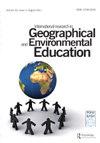An interdisciplinary approach to address aquatic environmental issues with young students from Brazil
IF 3.1
Q2 EDUCATION & EDUCATIONAL RESEARCH
International Research in Geographical and Environmental Education
Pub Date : 2021-06-30
DOI:10.1080/10382046.2021.1943220
引用次数: 4
Abstract
Abstract Environmental education aims to change the perception of people about the environment. Primary education (four to eleven years old) is a fundamental stage in the development of children’s conduct, so enhancing learning of the environment in which they live is essential for them to start recognizing nature as part of their life. We tested students’ perception before (pre-test) and after (post-test) a specific environmental education activity elaborated in a ludic and interdisciplinary way (psychological, biological, performing arts and educational perspectives), with more moments of practice than only theoretical or rhetorical. Our study showed that schools located in cities with low Municipal Human Development Index (MHDI) can present satisfactory results in relation to students’ environmental perception (hypothesis 1), that this perception does not differ according to nationwide educational indexes such as the Brazilian Basic Education Development Index (IDEB) (2), and that regardless of MHDI, there is an increase in this perception after environmental education activities, even a single activity (3). The developed methodology was effective in changing students’ environmental perception, and can be used in an interdisciplinary way, even when resources are scarce.一个跨学科的方法来解决水生环境问题的年轻学生来自巴西
摘要环境教育旨在改变人们对环境的看法。小学教育(4至11岁)是儿童行为发展的一个基本阶段,因此加强对他们生活环境的学习对于他们开始认识到自然是他们生活的一部分至关重要。我们测试了学生在(测试前)和(测试后)一项特定的环境教育活动之前和之后的感知,该活动以一种荒谬的跨学科的方式(心理、生物学、表演艺术和教育视角)进行阐述,实践的时间比理论或修辞的时间更多。我们的研究表明,位于城市人类发展指数(MHDI)较低城市的学校在学生的环境感知方面可以取得令人满意的结果(假设1),这种感知根据全国教育指数(如巴西基础教育发展指数(IDEB))(2))没有差异,在环境教育活动之后,这种看法有所增加,即使是一项活动(3)。所开发的方法在改变学生的环境感知方面是有效的,并且可以以跨学科的方式使用,即使在资源稀缺的情况下也是如此。
本文章由计算机程序翻译,如有差异,请以英文原文为准。
求助全文
约1分钟内获得全文
求助全文
来源期刊

International Research in Geographical and Environmental Education
EDUCATION & EDUCATIONAL RESEARCH-
CiteScore
5.20
自引率
33.30%
发文量
11
期刊介绍:
International Research in Geographical & Environmental Education publishes quality research studies within the context of geographical and environmental education. The journal endeavours to promote international interest and dissemination of research in the field, provides a forum for critique, and demonstrates the relevance of research studies to good professional practice.
 求助内容:
求助内容: 应助结果提醒方式:
应助结果提醒方式:


